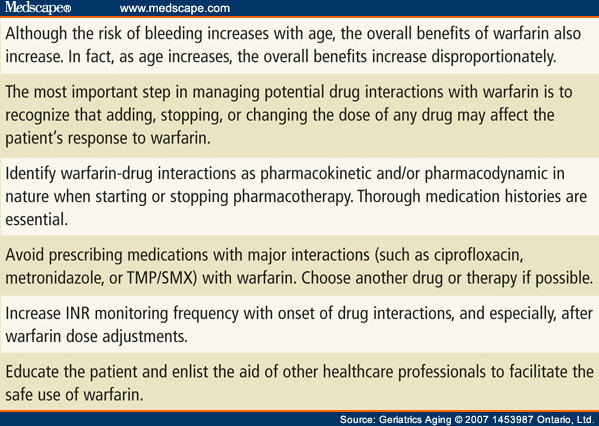

If there is a problem, your doctor may give you vitamin K, which is the antidote for warfarin. Fortunately, because warfarin has been in use for a long time, there is a proven method for addressing bleeding problems. If you develop bleeding complications from taking warfarin, your doctor will need to address it immediately. If you are taking warfarin, you will need to monitor your schedule carefully to ensure that you do not miss a dose of medication and you do not miss an INR test. INR tests must be done frequently however, your exact testing schedule will depend on your doctor’s recommendation.

INR tests allow your doctor to see how fast your blood clots and determine a healthy dose of warfarin for you. These tests are necessary to monitor how your body is responding to the medication. INR stands for International Normalized Ratio. This is why people who are taking warfarin are required to have regular INR blood tests to confirm the drug is continuing to work and that it is not causing problems. Like all blood-thinning medications, warfarin increases the risk for severe internal bleeding. While warfarin has been proven to be effective for preventing blood clots, it does have some drawbacks that you should be aware of. Warfarin is the oldest and perhaps the best known, of the blood-thinner medications. Be sure to speak with your doctor about your condition, symptoms and treatment options. It should not take the place of a doctor’s recommendation. Note: This information is intended only to provide an overview. This page is meant to familiarize you with warfarin and how it may be used to treat Afib. You can learn about these treatment options here. If you and your doctor decide that anticoagulants are not right for you, there are other treatment options available. Others struggle to take the medications as prescribed or cannot handle the side effects. Many people do very well with anticoagulants, but some cannot take an anticoagulant because it increases the risk for internal bleeding. If you have Afib, it is very likely that your doctor has prescribed medications to help control your heart’s rate and rhythm as well as an anticoagulant medication to prevent clots. It is a less expensive option than the newer anticoagulant medications that are available.

Warfarin has been prescribed for stroke prevention since the 1950s. If a clot travels to the brain, it can cause an ischemic stroke. As a result, blood can collect in the heart’s left atrial appendage and clots can form. When the heartbeat becomes irregular, the heart may not be able to pump blood as it should. People who have atrial fibrillation ( Afib or AF) are at risk for blood clots because their heart does not beat normally. Warfarin (brand name: Coumadin) is a medication in the class of drugs known as anticoagulants, which were developed to lower the risk of blood clots.


 0 kommentar(er)
0 kommentar(er)
